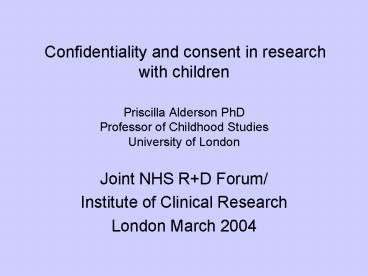Confidentiality and consent in research with children - PowerPoint PPT Presentation
1 / 19
Title:
Confidentiality and consent in research with children
Description:
Similar to adults' rights except usually people with parental ... uncertainty and equipoise * and of relevant terms, such as: double blind trial. randomisation ... – PowerPoint PPT presentation
Number of Views:60
Avg rating:3.0/5.0
Title: Confidentiality and consent in research with children
1
- Confidentiality and consent in research with
children - Priscilla Alderson PhDProfessor of Childhood
StudiesUniversity of LondonJoint NHS RD
Forum/ - Institute of Clinical Research
- London March 2004
2
- Confidentiality
- Similar to adults rights except usually
people with parental responsibility are also
informed and involved - Rules for disclosing information to parents
with childs agreement - Rules for reporting risks of abuse
- Opt in access
- Practical respect for privacy and anonymity
- Avoiding mis-use of quotes, photos, videos
3
- Consent to
- Therapeutic research
- (term omitted from Helsinki 2000)
- Therapy is treatment intended to benefit child
- Research is investigation
- when child helps researcher
- Research is to collect, analyse and report data
- If a treatment is being researched,
- actual or relative benefit is unknown, and
that is the research question not an assurance
4
- No clear law on consent,
- though much guidance.
- Not essential to follow the lowest standards.
- General emphases in UK
- Gillick competent children
- (with sufficient understanding and
discretion) - can consent to treatment
- Respect the young childs refusal
- to take part in research.
5
Voluntary consent Nuremberg Code 1947
begins 1. The voluntary consent of the
human subject is absolutely essential .free
power of choice without the intervention of
force, fraud, deceit, duress, overreaching, or
other ulterior form of constraint or
coercion.
6
Voluntariness an emotional as well as a
rational state Consent as a process And
emotional/rational journey From fear, rejection,
doubt To hope, acceptance, resolve Takes
time emergency an elastic term
7
- Informed consent Two way
- expert practitioner/researcher
- on conditions and treatments
- expert child and/or parent on life choices
- unique and essential knowledge - social and
bodily experiences - emotions and relationships - values, hopes and fears
- practical realities
8
- Assessing competence
- Four standards in the person giving consent
- Mental competence
- Sufficient information
- Sufficient understanding to make a reasoned
choice - Voluntariness and autonomy
- These are also four standards to assess
- in the people asking for consent
9
Four levels of decision making 1. To be
informed 2. To form and express views. 3. To
influence a decision. 4. To be the main decider
about proposed treatment or care. 1-3 Children
Act 1989, Children Act Scotland 1995. UN
Convention of the Rights of the Child
(1989) 4 Gillick v Wisbech and W Norfolk HA
1995 PAJM 1996
10
Protection for doctors who respect childrens
consent to treatment It is the doctors duty to
decide when a child patient is competent. Age of
Legal Capacity (Scotland) (1991) S2(4)
11
- Research on child (in) competence
- surveys of adults views
- surveys of representative children
- lab experiments/tests/hypothetical questions
- theories/speculation
- Versus research on child competence
- empirical research with experienced children in
context of their lives - everyday observation
- international comparisons of highly competent
children - - theoretical and textual analysis of history of
child incompetence
12
70 Health Professionals Views on WhenSome
Children Can Give Consent to Surgery
No of Replies
Mean 10.3 yrs (minus dk)
Stated Age
PA.1993
13
Informed consent involves knowing about the
interventions purpose, nature and
duration methods and means hoped for
benefits harms, costs and risks
alternatives effects on health and person
14
- Informed consent involves
- knowing the patients right to
- discuss questions
- have time to consider
- have access to parents
- have respect for confidentiality
- have written information
- have a named contact
- refuse
- withdraw from treatment without
- prejudice
- signify consent
15
Consent to research also involves knowing
whether the hoped-for benefit will be direct
and/or indirect the meaning and significance
of uncertainty and equipoise and of
relevant terms, such as double blind
trial randomisation control placebo
16
Overcoming barriers time confidence skill language
- terms - English
- more than words mid-years
alliance control anxiety reticence and
respect major and minor issues prejudice that
children are not competent
17
Consent
legal contract negotiation respect protection
event process one way two way to test
child to involve child Work to involve children
in planning trials, information and consent
forms outcome measures
18
Complications of Consent Intervention that
is complex distressing painful urgent major
irrevocable controversial moderate or high risk
of direct harm, indirect harm,
failure repeated attempts experimental
uncertain linked to research compound
complications many of these may apply
19
- Why respect childrens consent?
- Ethical principle of respect
- avoid coercion fear
- ignorance resentment
- encourage informed willing commitment
- learn from the child
- clarify misunderstanding and disagreement
- listen as part of therapy
- work together towards the
- least harmful decision































